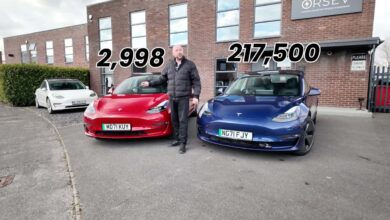Trump’s DOT Stops Key EV Charger Funding Program In Its Tracks

President Donald Trump’s Department of Transportation just dealt a blow to a key federal program that funds the rollout of electric vehicle charging infrastructure across the U.S.
In a letter to state transportation departments titled “Suspending Approval of State Electric Vehicle Infrastructure Deployment Plans,” the Federal Highway Administration (FHWA) notified states that their plans to deploy charging infrastructure under the $5 billion National Electric Vehicle Infrastructure (NEVI) program were no longer approved.
Under the NEVI program, states need to submit plans to the FHWA ahead of each fiscal year, outlining how they plan to use the funds. During the Biden administration, the FHWA approved the first four (out of five) years of state plans, for fiscal years 2022 through 2025. Although that funding was essentially unlocked by states, not all of it has been spent or committed (or “obligated,” in government speak) to projects.
We’d love to hear from you
Do you work for a charging company, state DOT, or the federal government and have information to share about EV policy? We’re happy to speak anonymously and securely.
Contact this reporter at tim.levin@insideevs.com, or on Signal at Tim_Levin.62
“The new leadership of the Department of Transportation (U.S. DOT) has decided to review the policies underlying the implementation of the NEVI Formula Program. Accordingly, the current NEVI Formula Program Guidance dated June 11, 2024, and all prior versions of this guidance are rescinded,” the letter reads.
“As a result of the rescission of the NEVI Formula Program Guidance, FHWA is also immediately suspending the approval of all State Electric Vehicle Infrastructure Deployment plans for all fiscal years. Therefore, effective immediately, no new obligations may occur under the NEVI Formula Program until the updated final NEVI Formula Program Guidance is issued and new State plans are submitted and approved,” it continues.
The FHWA did not immediately respond to questions about the move and how the NEVI guidance may change.
It’s the latest in a push from the Trump administration to halt climate-focused policies and programs that support the adoption of electric cars in this country. Trump’s first few weeks in office have been marked by unprecedented efforts from the White House to interfere with federal funds appropriated by Congress. A coalition of states and nonprofit groups separately sued the administration after ordered a wide-ranging pause on federal spending, leading two federal judges to block the spending freeze.
The DOT’s latest move could end up getting sorted out by the courts as well. NEVI funding was appropriated by Congress through the 2022 Infrastructure Investment and Jobs Act, and the program can’t be wiped away or indefinitely paused with the stroke of a pen.
Experts questioned whether the move to rework guidance and rescind funds was legal. That may be good news for the EV owners out there—and potential buyers—clamoring for more widespread, consistent access to public charging stations.
“The administration has every right to remove guidance and replace it with its own. Elections have consequences. But the memo appears flatly inconsistent with the law,” said Andrew Wishnia, a senior vice president at Boundary Stone Partners and the former Deputy Assistant Secretary for Climate Policy at the U.S. DOT. “There is one condition for states to receive NEVI dollars, and that is to develop a plan. Every single state has done so. No greater burden is required of them.”
Andrew Rogers, former deputy administrator at the FHWA, told Wired there is “no legal basis for funds that have been apportioned to states to build projects being ‘decertified’ based on policy.”

Photo by: InsideEVs
A NEVI site opening in New York.
Ryan Gallentine, managing director at Advanced Energy United, a group representing companies in the energy sector, including charging firms, also questioned the memo’s legitimacy.
“States are under no obligation to stop these projects based solely on this announcement. We call on state DOTs and program administrators to continue executing this program until new guidance is finalized,” Gallentine said in an email.
At the very least, the decision casts a cloud of uncertainty over funds that state transportation departments were counting on and planning long-term decisions around.
“This announcement creates great uncertainty for the billions of dollars states and private companies are investing in the urgently needed infrastructure to support America’s highway transportation network,” Gallentine said.
The Federal Highway Administration said that states may not obligate new funds—meaning legally commit funds that were previously approved to new projects. However, funds that have already been obligated won’t be affected, the administration said.
“Until new guidance is issued, reimbursement of existing obligations will be allowed in order to not disrupt current financial commitments,” the letter said.
A lack of good, reliable EV charging plugs is one of the primary barriers to wider EV adoption in the U.S., That’s a roadblock NEVI aims to address by funding the construction of thousands of charging stations, starting with major highways. Although the NEVI program took longer than some had expected to bear fruit, the federally funded network is growing steadily. As of late January, there were 51 NEVI stations with 224 charging ports across 14 states, according to the charging data firm Paren.
Got a tip? Contact the author: Tim.Levin@InsideEVs.com
Source link

